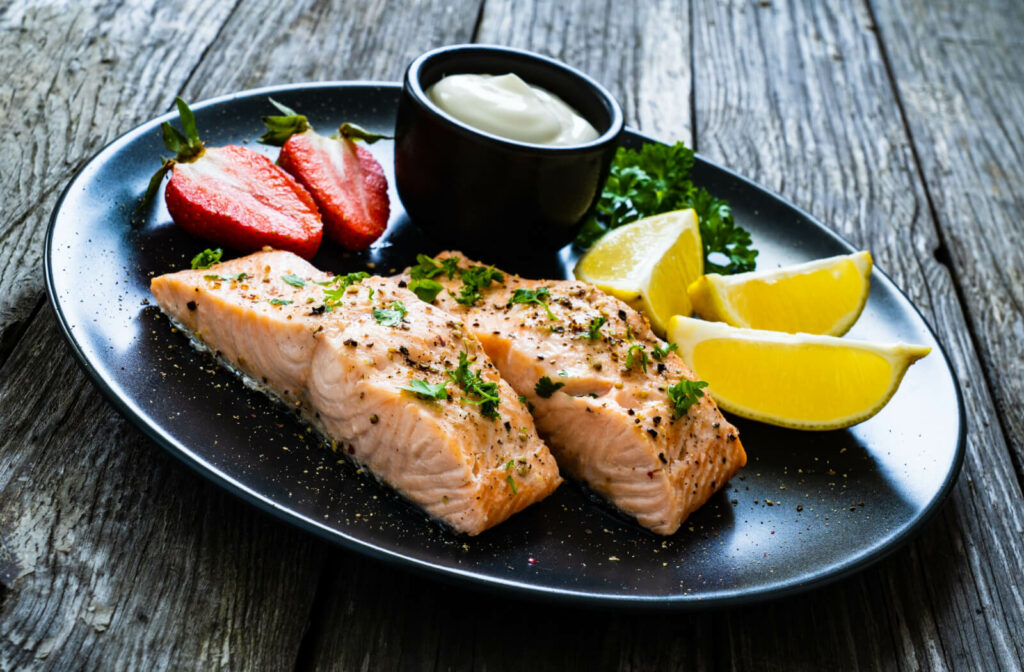Aging well requires many things, such as strong relationships, community engagement, a comfortable environment, and good physical health. Healthy eating is another essential part of aging well, maintaining independence, and supporting your quality of life.
A balanced and healthy meal plan for seniors should include a variety of nutrient-dense foods that can help maintain their heart and overall health, improve cognitive function, reduce the risk of chronic diseases, and promote a healthy weight.
Senior living communities offer residents services such as chef-prepared meals and daily snacks to meet their nutritional and dietary needs. Here we discuss some tips for creating a healthy meal plan for seniors, including breakfast, lunch, and dinner ideas.
The Changing Needs of Seniors
As you age, you may have specific dietary requirements or face different health challenges. Changes to nutritional needs and food habits can include:
Calories
As we age, our bodies may require different nutrients to maintain a healthy weight. However, this doesn’t necessarily mean you need fewer nutrients to stay healthy. In fact, with less energy and limited mobility, it can be beneficial to increase your nutrient intake slightly.
Appetite
As seniors age, we can see a shift in their senses, particularly smell and taste. While this can lead to a decrease in appetite, it is still important to ensure you are getting the adequate nutrients and calories needed for muscle and bone health. Eating balanced meals full of nutrient-rich foods can help keep you strong and healthy as you age.
Medical Conditions
For those with medical conditions such as diabetes, heart disease, and arthritis, dietary modifications can help maintain good health and keep their bodies functioning optimally. Eating nutritiously can ensure we are able to enjoy our golden years happy and healthy.
Medications
Medications for chronic health conditions can affect your appetite, where changes to diet may become necessary. Consulting your doctor before taking medication is vital for medication management in seniors.
Oral Health
Proper oral health and hygiene is key for seniors in order to maintain the ability to eat. With correctly fitted dentures and maintaining good dental practices, you can enjoy your meals without fear of infections or discomfort. Taking proper care of your teeth and gums can allow you to make the most out of your dining experiences.
Immune System
As we age, it is important to prioritize our immune health in order to reduce the risk of illness. Eating a balanced diet of nutritious foods can help strengthen your immune system. Avoiding foods that may trigger an adverse response is an important part of this process.
Components of a Healthy & Balanced Meal
Here are some key components to consider when creating a healthy meal plan for seniors:
- Adequate protein: Seniors need to consume enough protein to maintain muscle mass, support healing and wound repair and support a healthy immune system.
- Fiber-rich foods: High-fiber foods such as fruits, vegetables, whole grains, and legumes can improve digestion and regulate blood sugar levels.
- Whole foods: Choose foods that are minimally processed and free of additives.
- Healthy fats: Good fats such as monounsaturated and polyunsaturated fats are important for heart health, joint mobility, and brain function.
- Calcium and vitamin D: Adequate calcium and vitamin D are essential for strong bones, reducing the risk of osteoporosis.
- Hydration: Staying hydrated is crucial for seniors, as water can aid in digestion and absorption of nutrients.
Sample Healthy Meal Plan for Seniors
With these principles in mind, seniors should limit their intake of saturated fat, added sugars and salt, and incorporate regular physical activity with a balanced meal plan to help maintain good health.
Let’s look at some specific meal ideas for breakfast, lunch, and dinner for seniors:
Breakfast
- High-fiber cereal with skimmed milk, fruit juice, and tea or coffee
- Smoothie with spinach, fruit, and yogurt
- Vegetable omelet with whole-grain toast
- Avocado breakfast bruschetta
- Banana split oatmeal
- Eggs over kale and sweet potato grits
Snack
- Mixed nuts
- Fruit
- Smoothie
- Tea or coffee
- Baby carrots and hummus
- Celery with natural peanut butter
- Fruit and yogurt
Lunch
- Meat sandwich with salad
- Chicken and vegetable salad
- Vegetarian pizza
- Spaghetti with meat sauce
- Chicken, tomato, and avocado sandwich on whole-grain bread
- Quinoa with stir-fried vegetables
- Apple coleslaw
- Black bean and sweet potato quesadillas
- Tuna salad
Dinner
- Chicken with rice and vegetables
- Salmon with vegetables and fruit
- Vegetable stir fry with chicken
- Roasted turkey and vegetables
- Chicken breast, roasted vegetables, and hummus
- Roasted salmon, zucchini, and sweet potato
- Whole-wheat pasta, ground turkey, and tomato sauce
- Fish with spinach
Healthy Eating at Mattison Crossing
It’s important to remember that every senior has unique nutritional needs. Consulting with a healthcare professional or registered dietitian can help create meal plans to meet specific needs and preferences.
Mattison Crossing is proud to offer chef-prepared meals to create savory experiences that meet residents’ nutritional requirements. Contact us to learn more about our menus and how we can accommodate your dietary and health needs.




